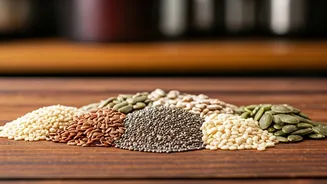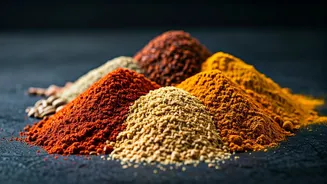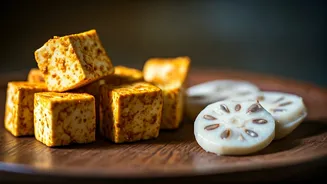Chia Seeds: Tiny Wonders
Chia seeds have become very popular in the health and wellness space, and for good reason. They are packed with soluble fiber, which plays a crucial role
in lowering LDL (bad) cholesterol levels. The fiber in chia seeds binds with cholesterol in the digestive tract, preventing its absorption into the bloodstream. In addition to fiber, chia seeds are a good source of omega-3 fatty acids, known for their anti-inflammatory properties and ability to improve heart health. Regular consumption of chia seeds can also help regulate blood sugar levels, contributing to overall cardiovascular health. Incorporating chia seeds into your diet is simple; they can be added to smoothies, yogurt, oatmeal, or even sprinkled on salads. Just a couple of tablespoons per day can provide a significant boost to your heart health.
Flaxseeds: Omega Powerhouse
Flaxseeds, another excellent source of omega-3 fatty acids, contribute significantly to heart health. These seeds contain alpha-linolenic acid (ALA), which the body converts into EPA and DHA, two vital omega-3s. These fatty acids help reduce inflammation, a major contributor to heart disease. Furthermore, flaxseeds are rich in lignans, compounds that have antioxidant and anti-inflammatory properties, further safeguarding the heart. When consuming flaxseeds, it's best to eat them ground to enhance nutrient absorption. You can grind flaxseeds at home using a coffee grinder or buy them pre-ground. Flaxseeds can be added to cereals, baked goods, or used as a binder in vegan recipes. Regular intake of flaxseeds can lead to notable improvements in cholesterol levels and overall heart function, supporting a healthy cardiovascular system.
Pumpkin Seeds: Nutrient Rich
Pumpkin seeds, often overlooked, are a treasure trove of nutrients beneficial for heart health. They are a significant source of magnesium, a mineral essential for regulating blood pressure. Adequate magnesium intake helps relax blood vessels, reducing blood pressure and, consequently, the risk of heart disease. Pumpkin seeds also offer a good dose of antioxidants, which combat free radicals and protect the heart from damage. The seeds are also rich in healthy fats and fiber. To enjoy the benefits of pumpkin seeds, you can roast them with a sprinkle of spices, add them to salads, or simply eat them as a snack. Pumpkin seeds provide a tasty and effective way to support heart health while adding a boost of flavor to your diet. Including pumpkin seeds in your daily nutrition can contribute to improved cardiovascular well-being.
Hemp Seeds: Heart Friendly
Hemp seeds, derived from the hemp plant, are gaining recognition for their impressive nutritional profile, particularly in promoting heart health. They are a complete protein source, containing all nine essential amino acids. Hemp seeds are also a rich source of omega-3 and omega-6 fatty acids, crucial for reducing inflammation and maintaining healthy cholesterol levels. These seeds are also packed with fiber, which aids in lowering LDL cholesterol. The balance of fatty acids found in hemp seeds is optimal for heart health, providing a synergistic effect that promotes overall cardiovascular wellness. Hemp seeds have a mild, nutty flavor, making them versatile for various dishes. They can be added to smoothies, salads, yogurt, or used as a topping for meals. Regular consumption of hemp seeds provides the necessary nutrients to keep the heart functioning at its best, supporting long-term health.
Sunflower Seeds: Healthy Boost
Sunflower seeds are a delightful and nutritious addition to any diet, known for their positive effects on heart health. These seeds are packed with vitamin E, a potent antioxidant that protects cells from damage and reduces inflammation in the arteries. Sunflower seeds are also a good source of healthy fats, which contribute to improved cholesterol levels and overall heart function. Moreover, they contain phytosterols, plant compounds that can help block the absorption of cholesterol in the gut. Sunflower seeds are easy to incorporate into your diet. They can be eaten as a snack, added to salads, or incorporated into various recipes. Regular consumption of sunflower seeds helps provide the heart with essential nutrients to maintain optimal health and function.
Sesame Seeds: Tiny Wonders
Sesame seeds, another powerhouse of nutrition, are beneficial for heart health thanks to their array of essential nutrients. These seeds are a great source of lignans, which act as antioxidants and help lower cholesterol levels. Sesame seeds also contain healthy fats and fiber, both contributing to improved cardiovascular wellness. In addition, sesame seeds provide magnesium, which aids in blood pressure regulation. Consuming sesame seeds regularly can help lower the risk of heart disease by promoting healthy cholesterol levels and supporting the overall function of the cardiovascular system. Sesame seeds can be used in a variety of ways. They can be sprinkled on salads, used in baked goods, or added to stir-fries. They also add a delicious flavor and texture to any dish while providing important nutrients for a healthy heart.













